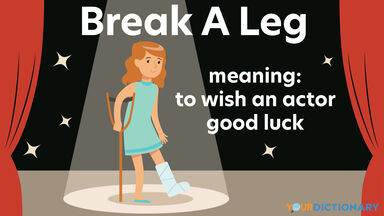

Even if that's true, you should have worked out during rehearsal where you would be coming from - the bathroom, having just brushed your teeth? The kitchen in the middle of baking an apple pie? The car after being stuck in traffic? Shopping? What is your state of being supposed to be on your entrance? Does it tell you in the text? Has your director informed you of what they would like it to be? Or do you have to invent it? What's just happened in the scene before? Have you just had an argument? Have you just been proposed to? Whatever the situation, you should always know your previous circumstances at all times. When you make an entrance on stage it shouldn't look as if you've just stepped on stage from behind the curtain. You need to work out what your character has been doing, where they've been. People expressed themselves differently then and didn't slouch or use modern gestures. We must be aware that we can't bring our modern physicality to a play that is of another period. We would also hold ourselves differently if the piece was set at the turn of the century. We tend to carry ourselves differently in the colder months than we do on hot, muggy summer days. We need to know what season it is, what year, what time of day. The geography will have an impact too: playing someone from very cold northern climates such as Norway or Russia will be different to playing someone in a baking Mediterranean climate such as Italy or Spain. For example, you wouldn't start walking around, touching ornaments and putting your feet up if it wasn't your home. You need to establish your relationship with your environment because this affects the way you use yourself. What does it mean to you though? Is your character supposed to be familiar with the surroundings? Is it the first time you've entered this room? Is it a cosy cottage? A freezing barn? A familiar street? We usually behave differently depending on our surroundings. You might find in the script a description of the room you're supposed to be in, including details such as the style and period of the furniture. You can't use your imagination without the backup of research and reading. Don't underestimate the power and the necessity of your imagination in the acting process. The final stage in building a character, once you've filleted the script and completed your research, is to use your imagination to flesh out the details you've gathered and bring them alive. The more visceral your understanding, the better. Fill your mind with images - not facts and figures. Possible sources include the internet, films of the era and finding images of landscape, as well as going to museums, art and photographic galleries. You need to find out through detailed research what the history, economics, politics, music, art, literature, theatre, film, foods, fashion, religion might have been at the time the play was written, in order to know how you would have lived and what and who your influences were, just as you know these things in real life. All this should be extracted and written down in a separate notebook. So how do you build a character? Well, first a good script should give you some initial information about your character, and also what other characters say or think about your character can be very revealing. As an actor you have to plant those memories, anecdotes and backstory. Of course that doesn't just magically happen, nor does it evolve just from rehearsals.
#Define onstage tv
When you play a character in theatre, TV or film, you should know your character as well as you know yourself, so you can just exist and live. They've seeped into our being, our muscles, our subconscious, allowing us just to be, to exist. Most people don't walk around with all these memories on their shoulders like baggage. All these good, bad, funny, interesting experiences shape us into who we are today. Your first kiss, first job, your likes and dislikes, influences, attitudes, anecdotes. Your education, favourite teachers, best friends, times you got into trouble. Your earliest childhood memories, the kind of games you played, family holidays. Your favourite room, what you could see out of your bedroom window, the smells you remember. Also the house you grew up in, what it looked like, inside and outside. You would be able to describe them in detail. I'm sure if I asked you that question, you would be able to tell me about your family background, your parents, grandparents, siblings. The first question is dealing with the type of person you are. How will I get what I want by doing what? What will happen if I don't get it now?ĩ.

This is based around Stanislavski's acting technique and his seven questions which, over the years, I have adapted into 10 key acting questions every actor should answer in order to be a fully rounded and connected actor.Ĩ.
#Define onstage professional
In order to help you understand, I will lay out the backbone of what I teach at RADA and around the world to professional and student actors alike.


 0 kommentar(er)
0 kommentar(er)
